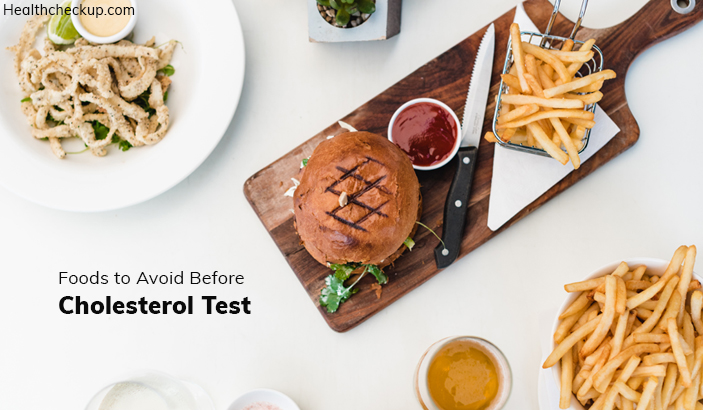In cardiovascular risk assessment, the lipid profile also known as Cholesterol Test is a vital investigation and it has become one of the routine tests in medical checkups. The lipid profile checks the level of total cholesterol, high density lipoproteins, low density lipoproteins and triglycerides.
High density cholesterol is known as Good Cholesterol and high levels of reference are recommended as healthy. Low density cholesterol is considered as Bad Cholesterol and patients are advised to keep it at a lower level. There are certain foods to be avoided before a cholesterol test, which are found to be causing an alteration in the cholesterol test. The test can be performed as a fasting test or a non-fasting test. Evidence suggests that the fasting lipid test will overcome the effect of elevated post-prandial triglyceride level. Patients should be provided with adequate information on foods to avoid before a cholesterol test.
In a fasting lipid profile, all patients should fast for 12 hours prior to the test.
- They must avoid eating any type of solid or semisolid food during these 12 hours. But it is important to state that the patient should continue drinking water and any medication he is on. After a meal, the calories of the foods are converted to triglycerides and they remain high in the blood for a significant number of hours. The need for fasting before the test is based on this concept.
[Read – Fasting Cholesterol Test Purpose]
When discussing foods to avoid before cholesterol test, it is also important to mention about the food habits to be followed one week before the test. Having a regular diet will allow the test to show the true values of the cholesterol levels in the body. But there are some food items which can elevate the blood cholesterol levels and those should be avoided one week before the test.
- Foods which are rich in saturated fatty acids like beef, lamb, poultry, pork, butter and milk raise the LDL cholesterol levels and lowers HDL cholesterol levels.
- Excessive consumption of full-fat cheese, egg yolks also should be avoided before a cholesterol test because they also contain a high amount of bad cholesterol level.
- Plant fatty foods like palm oil, coconut oil and cocoa butter also tend to increase the bad cholesterol levels.
- Foods which contain trans-fatty acids like fast food fries, cakes, cookies and pies also can increase the cholesterol levels. Because of that, patients are advised to avoid those types of foods, if they are planning to have a cholesterol test in one week time.
- Patients are advised not to indulge too much of sweets like desserts, chocolates before the test if they don’t normally consume them, because triglycerides are sensitive to sugar-containing food items and excess calories.
- Foods with high carbohydrate content like foods made with wheat flour ex:-white bread, instant rise and short eats are also considered as foods to avoid before cholesterol test because they also can raise the blood triglyceride level. Triglycerides can go high up in response to high-calorie intake because the body converts calories into triglycerides and stores them in the adipose tissues.
- Clinicians also recommend that consumption of excessive alcohol prior to the test should be avoided because it also can dramatically raise the body triglyceride levels temporarily.
[Read – What is LDL Cholesterol Test]
Food is not the only factor that can affect the body cholesterol level. Recent myocardial infarction (heart attack) or stroke can lower the cholesterol levels temporarily. Surgeries or ongoing infection can also lower the total cholesterol levels for a short period of time because these conditions increase the metabolic rate of the body. Certain medications like corticosteroids and hormones like estrogen can elevate the cholesterol levels and can give rise to falsely elevated cholesterol levels. Pregnancy is also a well-known condition which gives a falsely high cholesterol level as a result of physiological increment of the body cholesterol levels during the pregnancy period.
Generally, it is considered that every individual who is more than 40 years of age should undergo a routine lipid profile to exclude dyslipidemia. Because this age has been identified as the most vulnerable age of developing dyslipidemia and dyslipidemia related complications such as heart attacks and strokes.
Knowledge on food to avoid before cholesterol test is important for the patient to identify their true cholesterol levels of the body. Because there are many types of foods which can dramatically raise blood cholesterol levels. If the clinician can identify the true value of cholesterol in the individual the cardiovascular risk can be assessed and the future management plan of risk minimization can be made accordingly.
Dr. Chauturi is an experienced writer specializing in English language and Medical Sciences, and degree holder in Medicine, Bachelor of Surgery at University of Sri Jayewardenepura currently awaiting her internship.









